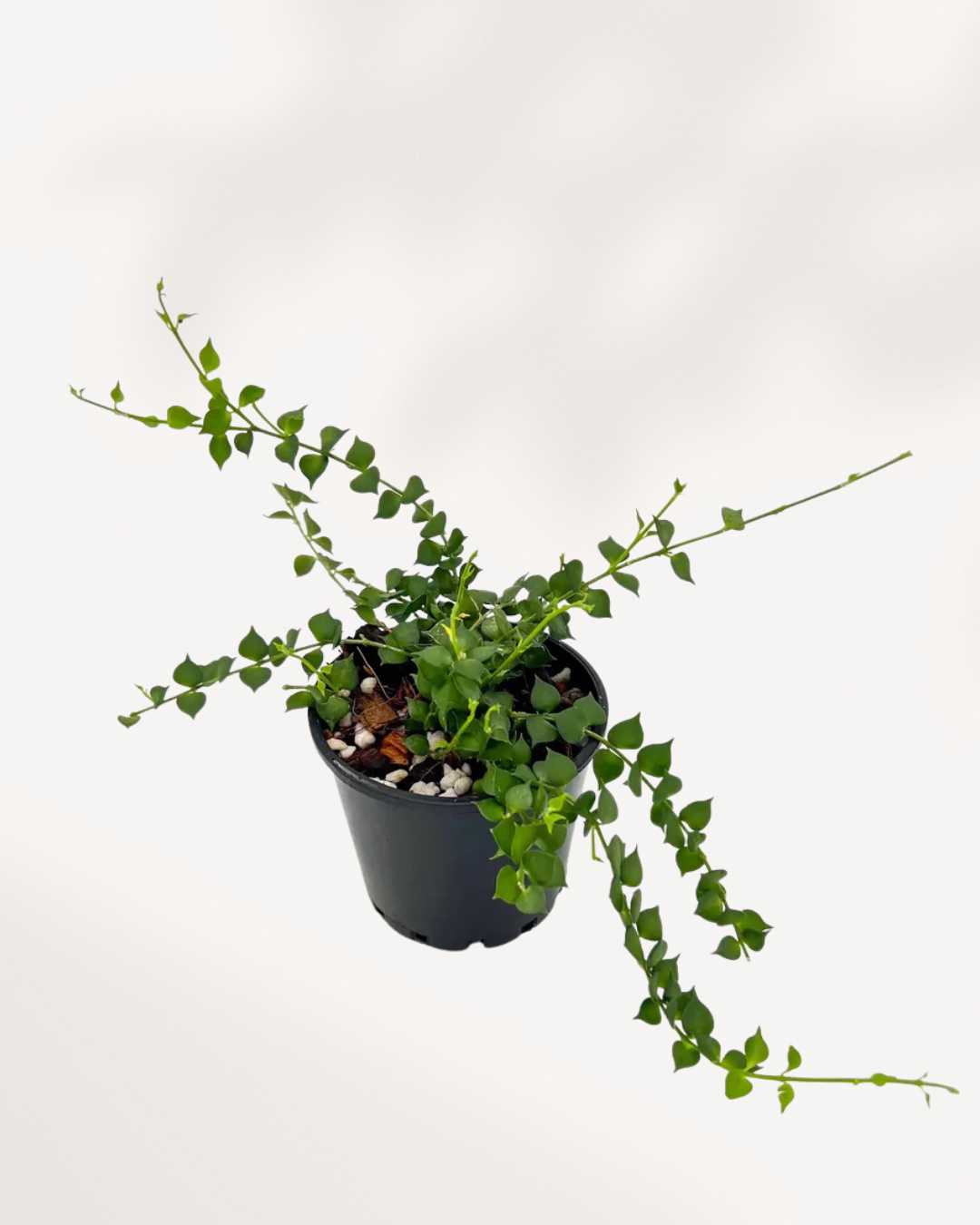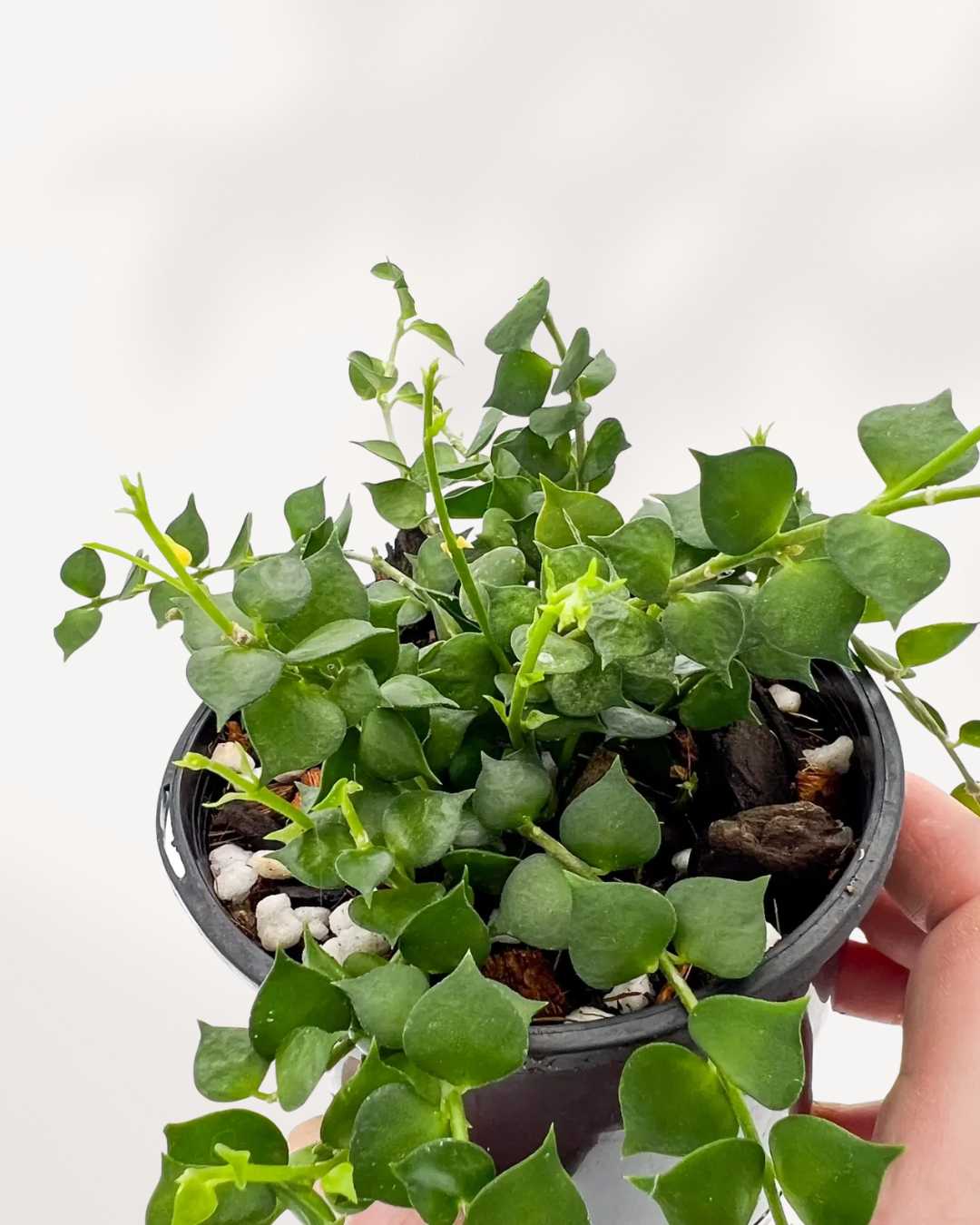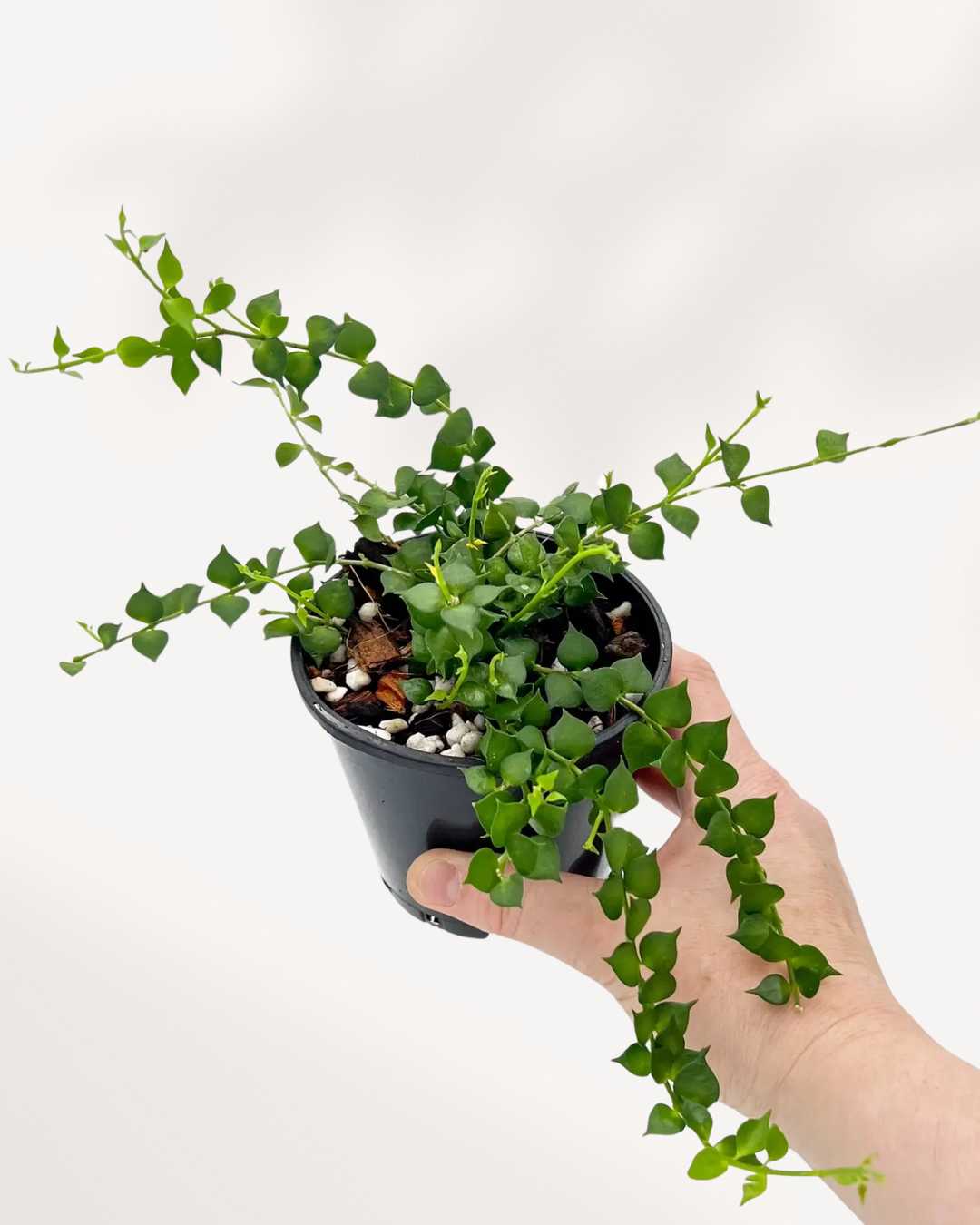Couldn't load pickup availability
Dischidia Million Hearts, also known as Dischidia Ruscifolia, is a charming trailing plant admired for its small, heart-shaped leaves that grow densely along slender stems. This tropical plant is perfect for hanging baskets, shelves, or cascading displays, adding elegance to any indoor space. Native to Southeast Asia, it thrives in warm, humid environments and requires minimal maintenance, making it an excellent choice for both beginners and plant enthusiasts.
Common Names
- Million Hearts Plant
- Dischidia Ruscifolia
- String of Hearts Lookalike
Botanical Classification
- Kingdom: Plantae
- Order: Gentianales
- Family: Apocynaceae
- Genus: Dischidia
- Species: Dischidia ruscifolia
Native Habitat
Dischidia Million Hearts is native to the tropical forests of Southeast Asia, where it grows epiphytically on trees. It absorbs moisture and nutrients from the air, making it a low-maintenance houseplant when grown indoors under similar conditions—bright, indirect light and high humidity.
Historical and Cultural Significance
The Dischidia Million Hearts is cherished for its heart-shaped leaves, symbolizing love and prosperity. Its trailing vines make it an excellent decorative plant for homes and offices, often used as a centerpiece in hanging baskets and wall planters.
Uses and Popularity
Popular for its compact size and trailing growth habit, Dischidia Million Hearts is widely used in indoor décor. It’s ideal for small spaces, terrariums, or vertical gardening setups, adding a touch of greenery without requiring much space or care.
Conservation Status
Dischidia Million Hearts is widely cultivated and not considered endangered. Its availability in nurseries and online stores ensures easy access for plant lovers worldwide.
Description
Physical Characteristics
Dischidia Million Hearts features trailing vines densely packed with small, glossy, heart-shaped leaves. Its compact size and cascading growth make it an excellent choice for hanging baskets, wall-mounted planters, or shelves.
Growth Habit
This plant has a trailing growth habit and can grow vines up to 3 feet long. It prefers warm, humid environments and adapts well to bright, indirect light indoors.
Popular Hoya Plants
Hoya Carnosa 'Krimson Queen'
- Variegated leaves with creamy-white edges, perfect for hanging baskets.
Hoya Compacta (Hindu Rope)
- Curly, rope-like foliage with fragrant flowers.
Hoya Australis
- Round, glossy leaves and clusters of fragrant blooms.
Hoya Obovata
- Round, flat leaves with speckled patterns.
Care Guide
Light Requirements
Dischidia Million Hearts thrives in bright, indirect light but can tolerate lower light conditions. Avoid direct sunlight to prevent leaf burn. Learn More
Watering Needs
Water when the top inch of soil feels dry. Avoid overwatering, as this plant prefers slightly moist soil with good drainage. Indoor Plant Watering
Soil Preferences
Use a well-draining potting mix designed for epiphytic plants or succulents. Adding orchid bark or perlite improves aeration. Indoor Potting Mix
Temperature and Humidity
Maintain temperatures between 65°F and 85°F (18°C to 29°C) with humidity above 50%. Use a humidifier or mist the plant regularly for best results.
Fertilization
Feed monthly during the growing season (spring and summer) with diluted liquid fertilizer. Reduce feeding in winter when growth slows.
Common Pests
Mealybugs
Mealybugs appear as white, cotton-like masses. Treat with rubbing alcohol or insecticidal soap. Learn More
Spider Mites
Spider mites thrive in dry conditions and cause stippling on leaves. Increase humidity and clean leaves regularly. Learn More
Scale Insects
Scale insects attach to stems and leaves, causing yellowing. Remove manually and apply neem oil. Learn More
FAQs
How often should I water Dischidia Million Hearts?
Water when the top inch of soil feels dry, typically every 7-10 days.
Can Dischidia Million Hearts grow indoors?
Yes, it thrives indoors with bright, indirect light and proper humidity.
Is Dischidia Million Hearts pet-friendly?
Yes, it is non-toxic and safe for pets.
How to take care of Dischidia Million Hearts
Sun: Indirect
Sun: Indirect
Light: Medium - Low
Light: Medium - Low
Water: When mostly dry
Water: When mostly dry
Humidity: Any
Humidity: Any
Pet Friendly: Yes
Pet Friendly: Yes
Pro Tip
Pro Tip
Delivery Policy for Plant Condition
Delivery Policy for Plant Condition
"I have only received part of my order. What to do?
No worries if you've only got part of your order! Our plants come from different nurseries and might arrive in separate shipments, typically 1-2 days apart. It's all part of ensuring your green friends reach you in top-notch condition!
If you do not receive the remaining packages within 48 hours contact support at info@mygreenscape.ca
What is the Life Time Support?
Absolutely! Lifetime support means you can count on us whenever you have questions or uncertainties about your plant. Whether you're puzzled by its behavior or just want to ensure it's thriving, we're here for you. Connect with us on Instagram @mygreenscapeto or shoot us an email at support@mygreenscape.ca.
When it comes to our guarantee for plants shipped with standard or express, rest assured that we offer a 30-day happy healthy plant guarantee on all such shipments. This ensures that your plants are covered for 30 days after delivery, giving you peace of mind regarding their condition. If you have any concerns within this period, feel free to reach out to us for assistance.
For further details, please visit our Local Delivery, Store Pickup, Standard Shipping Guide Page.
What to expect
What to expect
Your plant will arrive in a standard nursery pot, typically 0.5" - 1" smaller than the stated size to seamlessly fit into your chosen decorative pot. Washable Paper Planter Bags are available for separate purchase.
Just like nature intended, each plant is unique, showcasing natural variations in size, shape, and characteristics. Our commitment is to deliver a plant that closely resembles the one featured on our website, matching your chosen size, and with the potential to thrive happily in your home.
Frequently Asked Questions
Frequently Asked Questions
Certainly! If you're pondering about ordering plants online, you're not alone. We've compiled the most frequently asked questions. Check out our FAQ section here for quick answers! Happy planting!
Plant & Pot Size Chart
Plant & Pot Size Chart
Choosing the right pot size for your plants can be a daunting task, especially if you're new to gardening. But fear not! Our pot sizes chart can help you find the perfect match for your plants, ensuring they have enough space to grow and thrive. With our guide, you'll be able to confidently choose the right pot size and plant variety for your gardening needs.
Plant Pot Size Guide.

| Extra Small | 7-10 cm | 2.5 - 3 inches |
| Small | 11-12 cm | 3.5 - 4 inches |
| Medium | 14-17 cm | 5 - 6 inches |
| Large | 19-21 cm | 8 - 10 inches |
| Extra Large | 24-27 cm | 12 - 14 inches |
All sizes are specified in product details.
Your Complete Guide to Pot Sizes: What Size Should You Choose?

When selecting a pot for your plant, it's important to find the right size. But with all the different options out there, how do you know which one is best? We're here to help!
MyGreenscape's pot sizes chart is a great resource for finding your perfect fit. Our easy-to-read chart takes out all the guesswork and helps you quickly choose the right size for your plant.
Smaller pots are best for seedlings or small plants just starting out. These tend to be shallow but wide, allowing enough room for the roots of the young plant but not too much where they get overcrowded. Medium-sized pots are ideal when your plant has grown from its infancy and is ready for more space. These are deeper and wider than small pots, so that it can accommodate larger root systems - making sure your plant gets enough nourishment while still giving it breathing room. Large pots are top choice if you have an established plant in need of lots of space - think trees and large shrubs! The spacious depth and width allow plenty of room for deep root systems without struggling for air or light.
No matter what size you choose, MyGreenscape has got you covered, with our pot sizes chart guaranteeing you find the perfect fit every time!
Winter Shipping Protection
Winter Shipping Protection
We take extra care with each package during the colder months. For destinations experiencing cold weather, we provide insulated packaging and heat packs as needed to protect your plants from freezing temperatures. With Winter Shipping Protection, your plants are equipped to arrive safe and sound, even in winter’s chill.
Care Guide
Care Guide
Explore essential care tips. check out our Comprehensive Resource for Indoor Plant Care.



WATERING MADE EASY
Check soil moisture before watering and use a potting mix that drains well. It’s the secret to healthy, happy plants!
Hear From Happy Plant Parents.
Who have brought Mygreenscape plants into their homes.







